Evolution is the very essence of nature. And just like nature, every aspect of our being evolves gradually with age and experience. However, most important is perhaps our emotional evolution which aids in our self-discovery, self-awareness, and self-development.
What is emotional evolution?
When we are emotionally evolved, we feel we are in better control of our emotions. We understand who we are as an individual, what we want, and what we are capable of. We take responsibility for ourselves and learn to stay calm in chaos. We know how to deal with stress even though we may feel drained and exhausted. Emotional evolution helps us to manage our emotions consistently regardless of the situation.
It is more of a process that teaches us how to navigate through the wide range of emotions we experience as human beings, going through the ups and downs of life. It helps us understand how we feel about ourselves and those around us. It is crucial that we evolve emotionally so that we learn to let go of our negative emotions and make the best use of your strengths and resources.
Related: 5 Traits of an Emotionally Mature Person
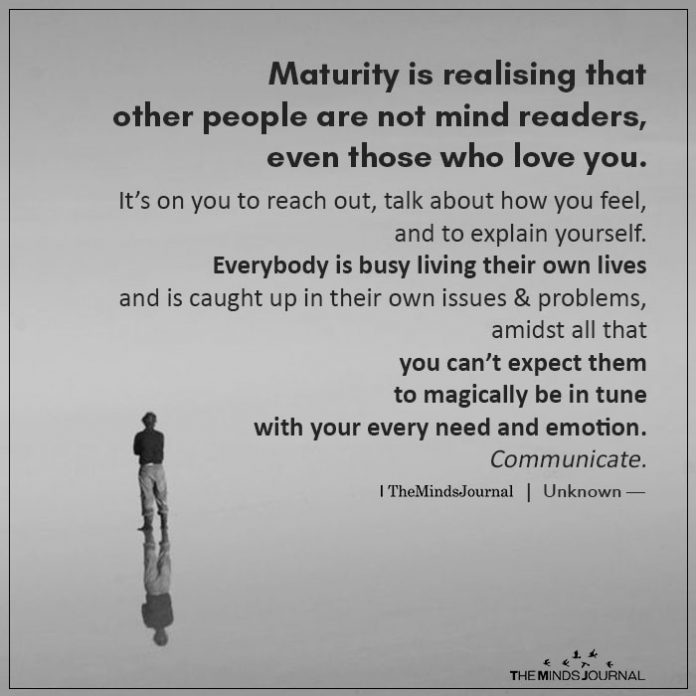
Emotional evolution helps us to be more positive and develop a fulfilling life by cultivating lasting and meaningful relationships. It makes us mentally flexible and more accepting of failures and rejections. It makes us more empathic and reach a new level of self-understanding.
However, we need to realize that we are always learning and evolving emotionally. Emotional evolution is more of a journey than a destination that we need to reach. And it is only with awareness can we truly evolve.
Signs you are emotionally evolving

Are you emotionally evolving? Have you changed as a human being over the past few years? There are certain traits of emotionally evolved people that make them stand out from the others. Here is a quick emotional evolution checklist that will help you understand yourself better –
1. You understand yourself better
You are aware of your own strengths and weaknesses and have found peace in being imperfect. The evolution of emotions has helped you gain a clearer understanding of your self-identity, even though you continue to learn more new things about yourself each passing day. Regardless, you know who you are and have a clear sense of what your purpose in life is. As you have matured emotionally, you have understood that you can’t make everyone happy. Someone will always be displeased with you and that is okay. You realize that you don’t need validation and reassurance from others, but only from yourself.
You know that even though you’re flawed, you are good enough to deserve love and happiness. You realize that you are above your thoughts or appearance, and it is only your awareness of yourself and the world is what truly matters.
Related: 6 Ways to Practice Self Curiosity and Become More Self Aware
2. You know when to let go
One of the best things about the evolution of human emotions is that it teaches us exactly what we need. Instead of holding on to unrealistic expectations, grudges, negative emotions, people and things that don’t serve you any longer, you have learnt to let go and accept life as it is. You have realized that holding on to things unnecessarily keeps you trapped in a negative space where you’re filled with stress, anxiety and suffering.
But when you start to let go of your negative emotions and accept them as a natural part of your being, without judging them, you can feel liberated. Using your emotions as an instrument of self-development is one of the basic signs you are emotionally evolving.
3. You are more empathetic
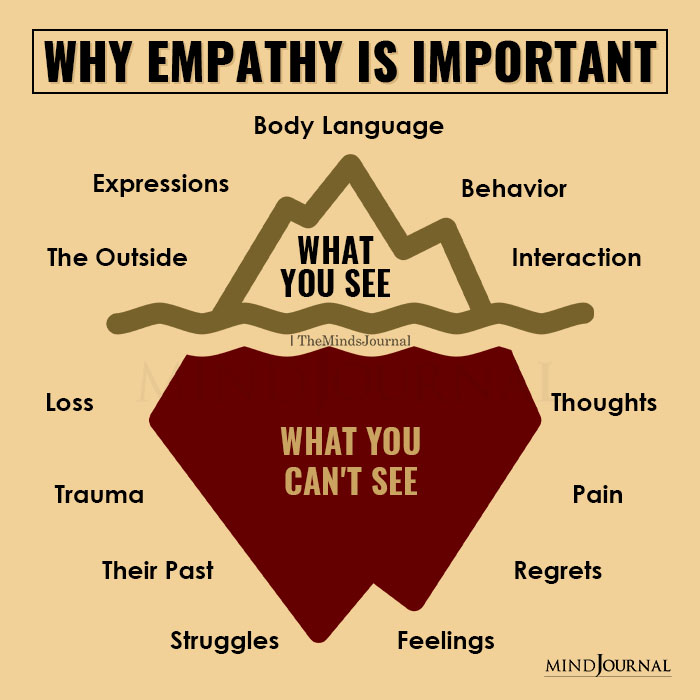
You have learned to gain new and different perspectives. Instead of looking at things from a particular perspective or judging others from only your own experiences, you can understand and relate with how others see the world and how they feel in a particular situation. You realize that no one is perfect and everyone is trying to do their best to survive. There is no right or wrong. There is no black and white. All of us are just trying to do what we think is right based on our morals, beliefs and values.
Instead of blaming others, you try to understand their point of view, and if needed, you change your stance on things. Being able to understand different perspectives allows you to see the bigger picture and realize how everyone and everything is connected. Your ability to understand others’ opinions is a crucial sign of emotional evolution.
Related: Empathy Vs Sympathy: How To Practice True Empathy
4. You are not afraid of change
You don’t allow your fears and insecurities to keep you trapped in your comfort zone anymore. Thanks to emotional evolution, you look forward to change now, whether in your career, relationship or social and personal life. As you have better control over your emotions, you have learned to manage your fear of the unknown. You realize that uncertainties are an intrinsic part of life and the only way to deal with them is to face them boldly.
Avoiding or running away from change is never a practical solution. This is why constantly seeking change is one of the most notable habits of emotionally evolved people. You thrive in transformation and have moved way past your comfort zone. You realize that growth comes through risks and change, and so you don’t shy away from doing what you are afraid of. It’s not that you don’t fear change now, it’s just that you have the courage and faith to know that you will be okay no matter what.
5. You apologize for your mistakes
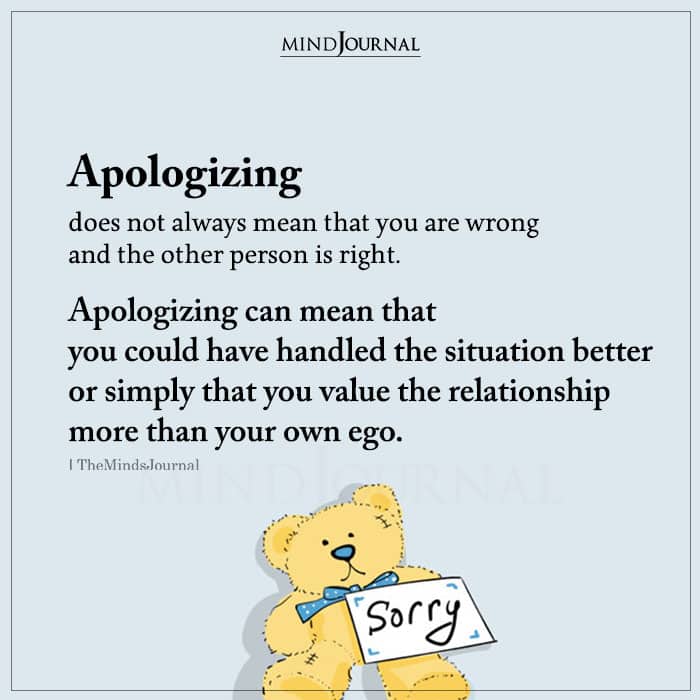
Emotional maturity is accepting your faults and having the courage to apologize for what you have done. Saying sorry does not make you feel humiliated or diminished, rather it liberates you. It makes you feel strong and humble at the same time. You don’t see apologizing to someone as an attack to your ego, instead you see it as a step towards making things better, for yourself and for others.
You accept that mistakes are a normal part of the human experience and you forgive yourself just like you forgive others. You realize it is more important to learn from your mistakes than to be right all the time. You consider an apology as a way to respect someone you have wronged and a way to respect yourself for learning from your mistakes.
Related: Why Men Struggle To Apologize
6. You respect others
When you are emotionally evolved, you learn to appreciate, value and respect the people around you. Instead of being jealous of others or judging them, you learn from them and feel inspired. Even when you may not necessarily like someone, you do not hold any bitterness against them. You make others feel comfortable around you which encourages them to be their most authentic selves. When disagreements occur, you don’t lose your composure and try to sort things as amicably as possible.
In fact, you feel happy praising and applauding the accomplishments of others. You realize that achieving goals and being successful takes a lot of effort and you have the ability to recognize and acknowledge that. By focusing on the good traits in everyone, you are able to build stronger, and more trustworthy relationships.
7. You don’t see yourself as a victim
Emotional evolution has helped you realize that complaining about your life will not get you anywhere. Instead of nagging, whining and crying over lost opportunities, you think about what your next step should be. You realize that having a victim mentality and being problem-focused is a recipe for disaster. So instead, take a more solution-focused approach to life.
You don’t blame others for the problems in your life. You realize that we create our own life and even though external factors may influence certain aspects of our lives, how we react to it determines the outcome. You believe that you create your own reality and you are not a victim to your circumstances. You focus on what you can change and let go of what you have no control over. You think you are responsible for yourself and have the ability to control the outcome of your life. In psychology, this is known as an internal locus of control.
Related: How To Rise Above Victim Mentality and Get Back Your Power
8. You don’t chase perfection
Emotional evolution has made you realize that perfection is an illusion. Instead of chasing some unattainable and unrealistic ideal or standard, you settle for whatever is “good enough”. You know that doing and giving your best is more important than being perfect. Chasing impossibly high standards will not only affect your mental health and lead to burnout, anxiety & depression, it will also affect your self-esteem and relationships.
You have learned to be happy with being “good enough” and being “perfect” is not a necessity for you any longer. You understand that it is far better to celebrate what you have now than run after something that only exists in your imagination. So you take your time to enjoy the little things even when your life isn’t necessarily “perfect”. Now, you gladly accept the imperfections in yourself, in others and in life.
9. You seek balance instead
Balance is perhaps one of the most vital aspects of the emotional evolution checklist. There is no doubt that balance is difficult to achieve in life but without balance, all of us will crumble. As a person who has gone through emotional evolution, you understand that being aware and balanced are crucial skills that can help you experience inner peace, satisfaction, and mental & physical well-being.
Your emotional maturity enables you to understand that balance doesn’t mean being able to control every facet of your life or doing everything you want to do. It means that you prioritize what is important in your life, even if that means sacrificing your pleasures for the time being. You do not ignore your needs to meet the needs of your loved ones. You realize that your needs are as important as those of others. So you put equal focus and energy in making yourself happy and taking care of your friends and family.
Related: Struggling with Your Work-Life Balance? Here’s How to Improve it
10. You are focused on personal growth
One of the most common habits of emotionally evolved people is that they are constantly focused on self-development. You understand that it is more important to focus your awareness on improving yourself than following others or the latest trends. You are more interested in learning new skills and doing things that you are passionate about than socializing on the weekends.
You are aware that you are imperfect and it is crucial that you take one step forward every single day to grow as a person. Although it is challenging at times, you know in your heart that it’s worth all the pain and effort. You also realize that it’s important to cater to your emotional needs and nourish your mental health. You also take time to nurture your inner child as it is the source of your uniqueness and creativity. However, you are careful enough to know when you need to pause and rest. You also understand that you should not take yourself too seriously all the time. You focus on being more positive in life and understand that there is a lot more to life than doing a job and paying bills.
Related: 15 Signs You Are An Emotionally Mature Person
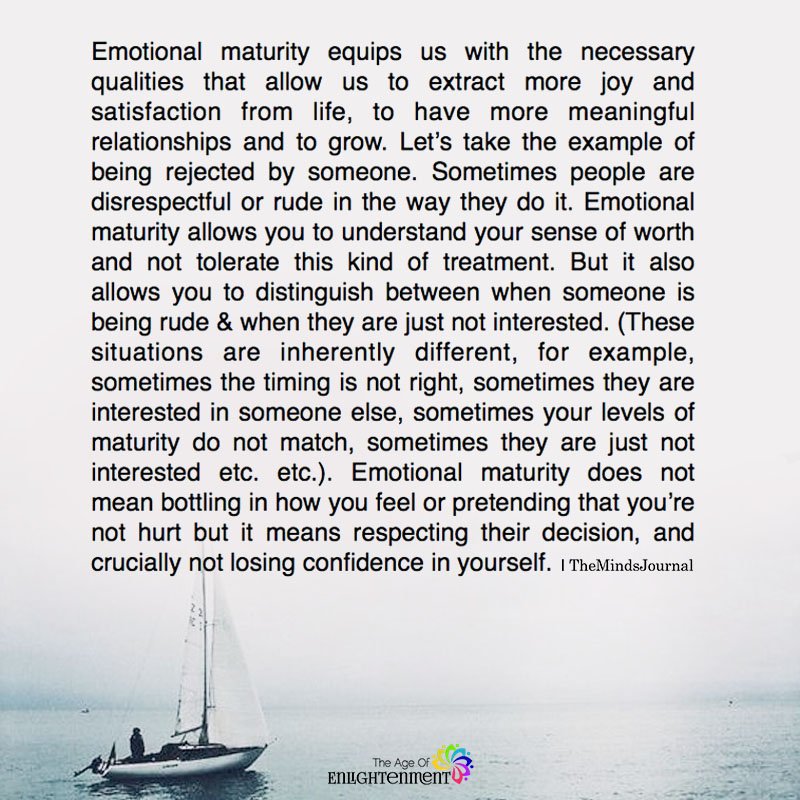
Traits of emotionally evolved people
If you are an emotionally evolved individual, then you will be able to relate with some of these common characteristics of people who have gone through emotional evolution –
- 1. You don’t keep unrealistic expectations from people
- 2. You understand the value of making sacrifices and compromises
- 3. You are more patient now and don’t behave impulsively
- 4. You know how to ask for help when needed
- 5. You realize that only you are responsible for your happiness and no one owes you anything
- 6. You prefer to live a simple yet satisfying life
- 7. You have cut off people who hold you back and socialize only with the right people
- 8. You have stopped comparing yourself with others
- 9. You understand the value of your time and are very selective about how you spend it
- 10. You do care about people, but not about what they think about you
- 11. You have healthy relationships with healthy boundaries
- 12. You are aware of your thoughts and feelings and try to control them
- 13. You are open to criticism and don’t take it personally
- 14. You are well aware of the prejudices and biases you have
- 15. You are more interested in improving your skills, than boasting about them
- 16. You are grateful for what you have
- 17. You know about the influence you have on others
- 18. You are independent & self-reliant
- 19. You know how to keep your ego in check
- 20. Your behaviors are not colored by your emotions
- 21. You have a good sense of humor and take things lightly
- 22. You have faith in yourself and your abilities
- 23. You are resilient and calm
- 24. You realize that you don’t know everything about everything and that’s okay
- 25. You are driven by values and believe in keeping commitments
Related: 6 Traits of Emotionally Immature People
Emotional evolution is a natural process
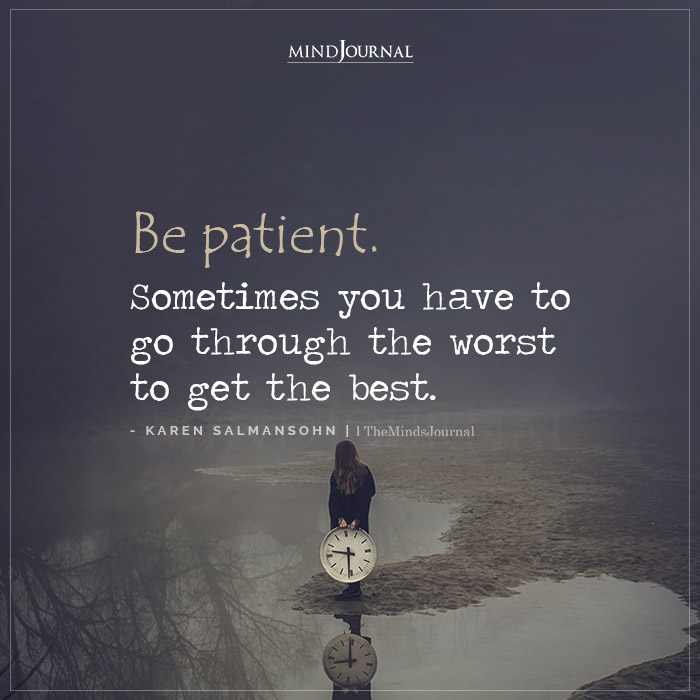
All of us go through the process of emotional evolution and mature at our own pace. Emotional maturity makes our lives less complicated, more productive, satisfying and happier. The more our awareness and consciousness evolves and matures, the more we become the person we were always destined to be.
This emotional evolution checklist will help you understand how emotionally mature you are and how capable you are of building the life you want for yourself. Being emotionally independent, you have the ability to turn difficult situations into opportunities through your maturity, resilience and balanced outlook.
Your ability to master your emotions gives you the power to master your life.
Related: How To Be A Better Person, According To Science



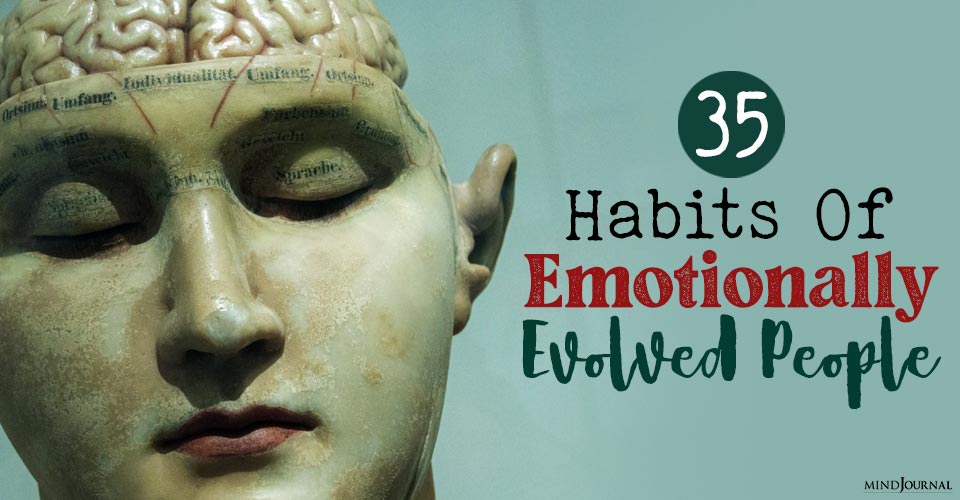
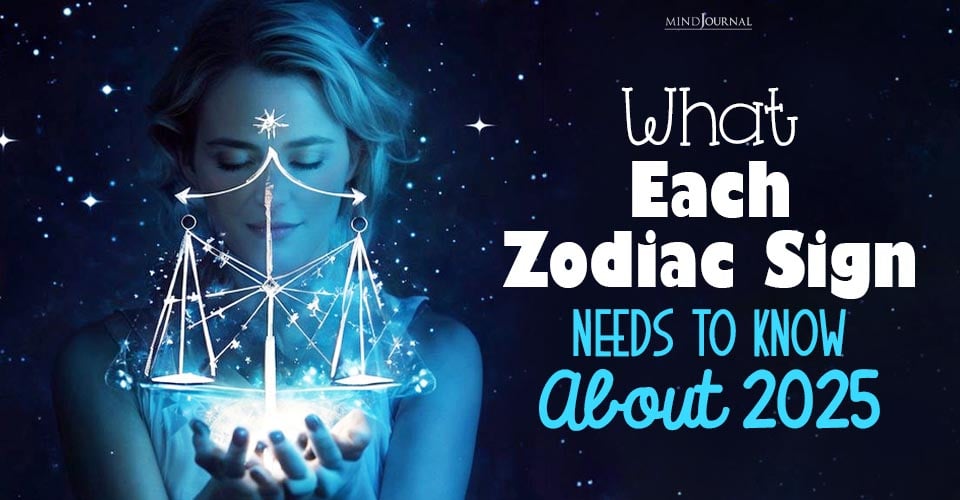






Leave a Reply